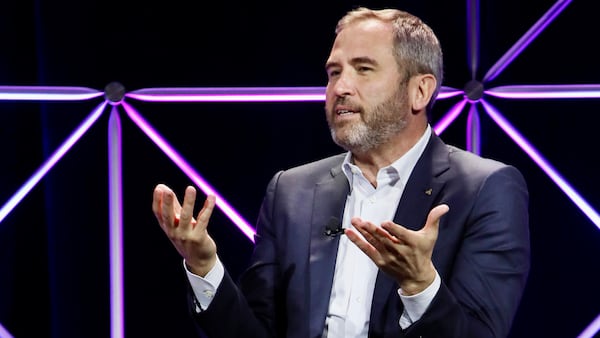- Ripple’s partial court win sets the stage for the firm’s global expansion, Europe boss said.
- While Ripple flexed its muscles by snatching up Metaco in May, the crypto firm has backtracked on plans to disrupt SWIFT.
Ripple has had quite the month.
A favourable ruling in its two year-long lawsuit against the US Securities and Exchange Commission, in which a judge decided that Ripple’s sales of its XRP cryptocurrency do not constitute investment contracts, has the firm riding high.
For UK and Europe boss Sendi Young, it caps a saga that began mere months before she joined the firm in June 2021.
It meant that taking the job shortly after the SEC filed the suit felt like a “leap of faith,” she told DL News.
NOW READ: Ripple’s private stock soared before shock SEC case ruling as traders saw ‘regulatory progress’
She spent the previous decade in traditional finance, first at HSBC, then consultant AlixPartners, and most recently as Mastercard’s global fintech lead.
“I had to think very hard before I accepted the offer,” Young said.
‘The SEC created this mess.’
— Brad Garlinghouse
July’s positive ruling shores up her decision.
Investors interpreted it as a sign that crypto may not fall under traditional regulations for trading stocks and bonds.
It is not quite so clear-cut. Institutional sales were still deemed securities transactions, while programmatic sales and distributions to employees were not.
Still, the industry has interpreted it as a victory — XRP soared some 60% in the days that followed — while the regulator may appeal the ruling.
And Ripple CEO Brad Garlinghouse blasted the SEC: “The SEC created this mess by proclaiming it was the cop on the crypto beat when it had no legal jurisdiction.”
‘It’s a huge win for Ripple, but also for the crypto industry’
— Sendi Young
“It’s a huge win for Ripple, but also for the crypto industry, particularly in the US,” Young said.
Since the SEC lawsuit was lodged in 2020, most of the firm’s expansion “has happened outside the US. The US will pick up and grow a lot more now.”
That will not come at the expense of Ripple’s UK and European growth though, she maintained, where headcount has swelled by about 75% in the last two years under her leadership.
The crypto firm, which allows people to use XRP to facilitate cheap, fast cross-border payments on its Ripplenet blockchain, has more than 100 of about 900 global employees based in London, Dublin, and Reykjavik, Iceland.
Ripple is further doubling down on the region, she added, by applying for registration as a crypto asset firm with the UK’s Financial Conduct Authority, something it did “very recently”.
It is also in the process of applying for a payment institution licence in Ireland.
NOW READ: Ripple Europe chief guns for UK licence after ‘huge win’ in US XRP case
“I’m very excited to see the momentum ... The UK is starting to make good on its promises to try to be this investment hub for [the] crypto space.”
“With the SEC case concluding we haven’t turned around and said, ‘Let’s stop hiring in the UK, let’s stop investing in this product.’ No, our strategy and growth plans are intact and in place. We continue to hire, we continue to invest.”
Ripple’s Metaco mega-merger
In May, Ripple bought crypto custody infrastructure firm Metaco for $250 million. The move gives it access to the Swiss company’s formidable lineup of clients.
Those include Citigroup, BNP Paribas, Singapore’s DBS, Spanish bank BBVA, Societe Generale’s crypto subsidiary Forge, and Standard Chartered’s crypto venture Zodia Custody.
NOW READ: Zodia Custody CEO on leaving Bitstamp, expansion plans, and what clients ask during a crypto winter
In a world where traditional finance firms are moving in and grabbing institutional digital assets market share, getting a direct line to such a stable of partners was one of the reasons for the deal, said Young.
However, a merger also made sense for the companies because they have “similar crypto DNA,” she added.
‘A lot of assets will continue to be tokenised, and there’s going to be a need to custody them.’
— Sendi Young
“[We have similar] visions of the world,” Young said. “A lot of assets will continue to be tokenised, and there’s going to be a need to custody them. That market opportunity is massive and only growing.”
NOW READ: It’s not just Bitcoin. These finance giants are ‘chomping at the bit’ to deploy DeFi
Nonetheless, the blockchain-enabled payments space is growing ever-more crowded. Mastercard and Visa are moving in with their own offerings.
Not to mention JPMorgan launched euro-denominated payments for corporate clients using its blockchain-based JPM Coin in June.
The Metaco deal was not motivated by any need for Ripple to diversify or hedge its bets, rather provide a more rounded offering with custody services built-in, Young said.
Services like this, and its liquidity platform which it launched in April, are “must-have services once you are in the space,” she said.
Nor did she convey worry about the future of crypto-native firms as more muscle in.
Fresh moves into crypto by financial giants include Deutsche Bank and BlackRock. While Citadel Securities, Charles Schwab and Fidelity’s crypto exchange EDX Markets went live last month.
“It’s all great news,” she said. “It’s testament that there is great value in the technology if applied well. This is not about making a quick buck. It’s about infrastructure. It’s about improvements. It is about solving problems.”
But, juggernauts like investment and custodian banks often take months, if not years to make decisions.
Ripple, meanwhile, is “agile … not covered by red tape, bureaucracies and big governance structures.”
“You want to put in processes, you want to have good governance, but if it means becoming really slow to move forward and bring those great benefits to the market. That’s something to watch out for as the space matures,” she said.
“Equally, [banks’] funds, customer bases and brands can work to spur innovation forward even faster than before. So it really depends on how it is played.”
Replacing SWIFT, or just complimenting it?
For all the talk of solving problems, Ripple has been forced to dial back its revolutionary tone over the last five years.
In 2018, Ripple CEO Brad Garlinghouse said he wanted to replace SWIFT, the decades-old global payments network which dominates the market for financial institutions. Swift stands for the Society for Worldwide Interbank Financial Telecommunication.
Young backtracked on some of that bolster.
When asked if the company would eventually replace the messaging system with its competitor, Ripplenet, Young said: “This is a very big space in cross-border payments. Everybody’s addressing it in different ways. In some ways, we are complementary, some we might be better or worse.”
Swift has been in partnership with blockchain infrastructure firm R3 since 2019, exploring ways to speed up and simplify payments processes.
“Problems around cost speeds, transparency, fees … still exist,” with SWIFT, Young said.
“I’m not going to say we are going to replace it tomorrow, but we have definitely provided innovation, and even, I would argue, forced them to look at blockchain and crypto and ways to innovate, and been a force for change in the industry.”
That may be so, but Young’s tone resembles that of most big digital assets firms these days.
In a post-crypto winter world where the world’s biggest institutions are muscling in on their patch, many now believe they can fine-tune the financial system — not bring it down.
“There are so many problems to be solved,” Young says. “No one can do it alone.”
Alex Daniel is a freelance journalist based in London. He has no significant crypto holdings. Do you have a tip about Ripple or another story? Let us know at tips@dlnews.com.



